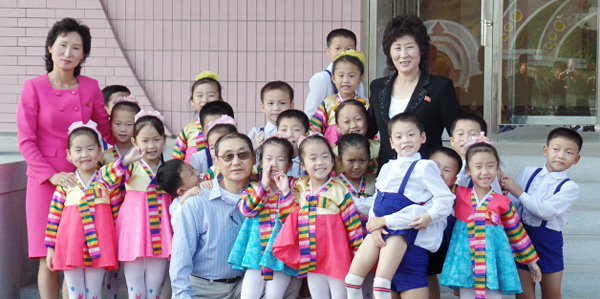By Ken Camp and Jeff Brumley
A Korean-American Baptist minister who has traveled to North Korea more than two dozen times in the last 19 years, delivering tons of corn and wheat noodles to schools, orphanages and hospitals, was denied permission to distribute food on his most recent overseas trip.
“Right now, North Korea’s government has banned any donation of food to the orphans, since the government guarantees the provision of food,” said Yoo Yoon, director of the Korean-American Sharing Movement of Dallas.
It’s an experience, to one extent or another, which many have faced working overseas.
“It’s not easy,” Ruben Ortiz, said about the negotiating the travel and religious restrictions on the island. Ortiz is a Florida-based Cooperative Baptist pastor and native Cuban who has been leading mission trips to Cuba several times a year since about 2000.
“You definitely need to know the regulations” which, Ortiz said, are constantly changing.
Time for love and patience
But those accustomed to such frustrations are usually skilled at changing plans to meet the situation.
Although changes in North Korean government policy prevented the food delivery in September, Yoon was allowed to deliver 200 soccer balls to orphans in Wonsan and Moonchon, cities in North Korea’s eastern Kwangwon province.
“It is sad that I could not bring 60 tons of corn and 10 tons of wheat noodles to feed the orphans of the schools in Wonsan and Moonchon cities,” said Yoon, former Korean mission field consultant with the Cooperative Baptist Fellowship.

“The leadership of the country has ordered all orphan schools not to accept any food from the outside, because the priority of the country’s leadership is to feed the neglected group of people like orphans and widows,” he said.
Sixty tons of corn was refunded to purchase 1,000 soccer balls, imprinted with messages such as “peace” in Korean. The balls are stored in a warehouse in Dandong, China, for future distribution, Yoon said.
After nearly two decades supervising the delivery of corn and wheat noodles provided by Texas Baptist Men and other donors, as well as medical equipment donated by Baylor Scott & White Health, Yoon expressed cautious optimism about finding ways to get supplies to people who need them.
“It is a time to wait, not to complain,” he said. “One of the elements of love is patience.”
‘A lot of red tape’
Ortiz said that philosophy also is required for those working in Cuba. The paperwork for religious visas are especially time-consuming and must be submitted three months ahead of travel.
Then it’s common for travel restrictions to change during that 90-day period, in turn requiring more paperwork and often drastic changes in who is traveling and what they can take with them, Ortiz said.
“I always advise [sending] small groups — six to 10 people — because it is very complicated with customs,” he said.
It’s also expensive to conduct ministry in nations like Cuba, Ortiz said.
The cost of the religious visa is $110 but the prices for transporting food, clothing, literature and other items can far exceed that.
The U.S. government charges travelers $2 per pound after 44 pounds for luggage and other containers being transported to Cuba. A recent trip cost five people, including Ortiz, a total of $700.

Once in Cuba, travelers are charged for every pound above 70, he said.
Those costs severely limit or punish travelers who want to bring in books, including Bibles.
Plus, the Cuban government will often confiscate large numbers of Bibles. So it’s best to have each traveler carry only three or four in their luggage, Ortiz said.
Building materials also are a challenge, financially.
“There is a big problem with tools,” Ortiz said. “You need to pay for those tools in Cuba what you paid in the U.S.”
Ortiz said the situation is much better today than it was 15 years ago. But a patient approach is still needed for every trip.
“There is just a lot of red tape in Cuban customs,” he said.
